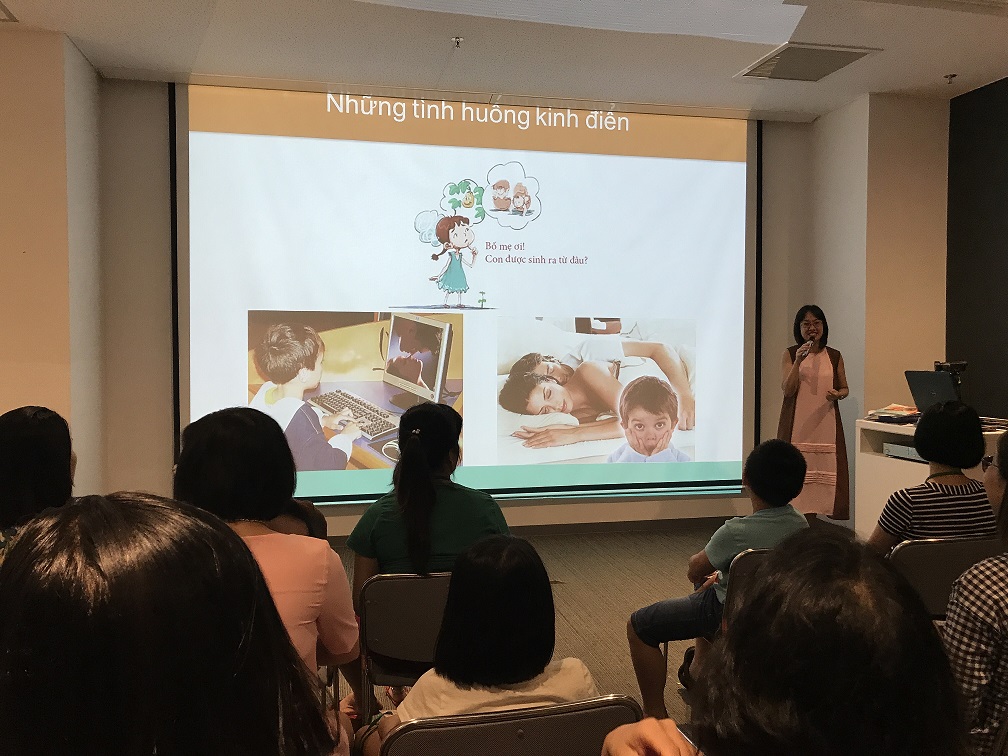On Sunday, October 15th, 2017, the CFC and Panasonic Risupia Vietnam organized a talk show called “When should we talk about sex with our children?” This is one of the programs in Panasonic’s series of activities to honor Vietnamese women, along with an opening program for the cooperation between Panasonic Risupia and CFC Vietnam. Once every 2 months, CFC and Panasonic Risupia will hold seminars on Skills for Parents.

In this program, Ms. Hoang Anh, the COO of CFC, shared with parents the five following topics:
- Sex education and misunderstandings
- Why is sex education necessary?
- When should parents start to educate their children about gender?
- Age – what should they know about gender?
- “Awkwardness” situations
Referring to “sex education,” people often think that it is telling children about the knowledge of physiology, sexuality and reproduction, family planning, etc. However, sex education is educating appropriate personalities based on gender and age of each individual. That is why the content of sex education should be gradually expanded along with the development of children. The main purpose of sex education is to build a healthy lifestyle in the relationship between the opposite sexes.
It seems like an academic term, but through the sharing of Ms. Hoang Anh, such sensitive topics become very fun and accessible.
For instance, to find a good answer for the question “How was I born?”, you can show them a clip based on fun facts and science, as the following:
Most of parents would answer for the question “When did/do you start sex education with your children?” is at the age from 3 to 7 years old, sometimes 10 years old. In fact, parents started sex education since the child was born.
From birth, differences in appearance could tell us that a baby is a boy or a girl. In addition, the way parents prepare for their child, for example, for boys, blue is often picked as preferable color and cars as toys; whilst, for girls, pink, cute bow, and princess are prefer. Those are very first gender “conceptions.” Furthermore, the way parents treat children and the way the react to each other also send a vivid message. All of the things mentioned above take an important part in children’s education, which unconsciously imprint into the child’s mind. Thus, this is the appropriate time to educate children about sex since parents even aren’t aware of what they are already teaching their children through family environment.
In the “What age – what should they know and how they know it?” section, Ms. Hoang Anh presented the basic content of sex education based on the aged range:
(Picture 1)
Additionally, let’s watch an interesting clip about teaching boys about “private areas” and how to protect the private area from potential sexually abuse.
Ms. Hoang Anh also mentioned a number of children books to help parents introducing gender story in gently and friendly way, which is still based on facts and science.
In this program, the set of questions about “awkwardness” situations were discussed as well, such as:
- Mom, where do I come from?
- I saw you two having sex.
- Parents caught their children watching pornography
- Parents saw the children while touching themselves or having inappropriate activities with their private areas
- Boys saw a girl’s private area, and then asked mom why they are different
- Child asked parents why hairs grow on his/her genital
The program received many open sharing, concern and appreciation from parents.
It is expected that in December, the CFC and Panasonic Risupia will have the incoming program to share with parents on topics of raising children aged 5 to 9 years old.







